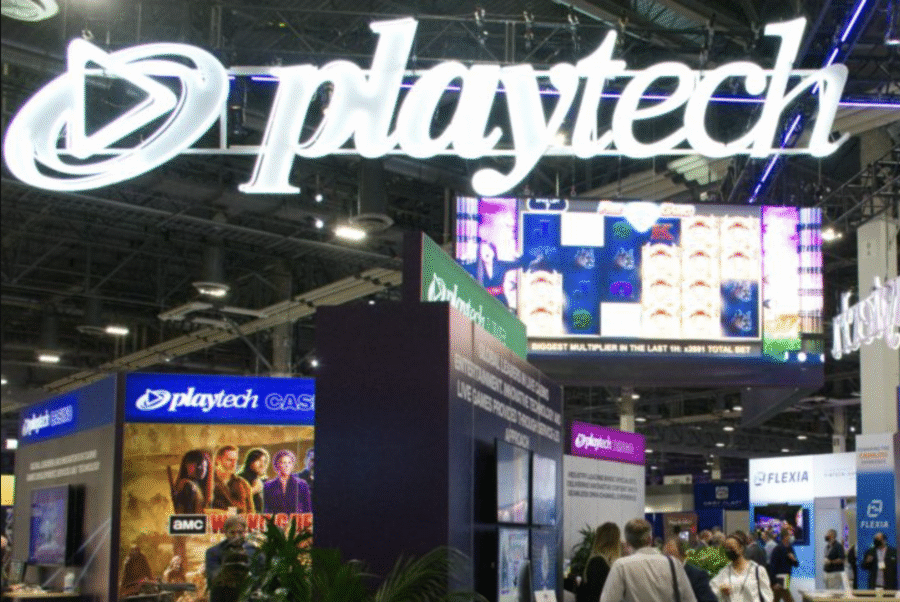Playtech named in alleged smear campaign against rival Evolution

London Stock Exchange listed igaming supplier Playtech is alleged to have been involved in a smear campaign targeting rival Evolution, according to a statement released by Evolution on October 21.
The revelation comes after years of litigation in the US, which has uncovered that Playtech Software Limited, a subsidiary of Playtech Plc, paid more than £1.8 million (US$2.4 million)1 GBP = 1.3351 USD
2025-10-22Powered by CMG CurrenShift to private intelligence firm Black Cube to produce a 2021 report that contained false claims against Evolution.
The report, which was later determined by two US regulators and the New Jersey Superior Court to be defamatory, was initially submitted to authorities by New York law firm Calcagni & Kanefsky and leaked to the media.
In February of this year, the New Jersey Superior Court directed Calcagni & Kanefsky to disclose the identity of the anonymous client behind the report, and concluded, “the report is not truthful and Plaintiffs… suffered damages and continue… to suffer damages in the casino gaming industry as a direct result of [the Defendants’] actions.”
According to Evolution, Black Cube used deceptive tactics in its investigation, including impersonations, false identities, and secret recordings of employees and board members.
Subjects mentioned in the report later disavowed its contents.
The New Jersey court has ruled that Playtech intentionally spread false claims to harm Evolution for competitive gain.
While Playtech’s involvement has now been confirmed, Black Cube is reportedly continuing to withhold information in defiance of court discovery orders.
Describing the report as a “smear campaign”, Evolution said in a statement, “We will continue to hold Black Cube, Playtech, and all the other players in this defamatory scheme responsible for their misconduct. We are confident in our legal position and look forward to finally holding Playtech and its accomplices to account for the significant harm they have caused.”
Playtech is reported to be standing by its decision to commission the report. Yesterday the firm’s share price plummeted by 34% amid widespread reporting of the story.
Earlier this month, Evolution launched its live casino brand, Ezugi, in New Jersey, with plans to launch in Michigan later on.
Charlotte Capewell brings her passion for storytelling and expertise in writing, researching, and the gambling industry to every article she writes. Her specialties include the US gambling industry, regulator legislation, igaming, and more.
Verticals:
Sectors:
Topics:
Dig Deeper
The Backstory
What the court fight reveals about a high-stakes rivalry
The current clash crystallizes years of tension in live casino gaming, where a handful of suppliers compete for distribution, talent and regulatory trust as U.S. states open their doors to online wagering. The latest disclosures, stemming from litigation in New Jersey, paint a picture of a market leader allegedly targeted by a competitor’s covert campaign. The allegations that a private intelligence firm used impersonations and secret recordings to assemble a report later deemed defamatory, and that a rival distributed it to regulators and the press, cut to the heart of how reputations are made and unmade in a heavily regulated business. They also arrive as both sides push deeper into the U.S., where licensing bodies, land-based partners and investors scrutinize track records as closely as product road maps.
Beyond the courtroom, the stakes run through every commercial conversation in live casino—who can be trusted to power a pit on a casino floor, stream compliant content across state lines and stay onside of suitability reviews. The case’s timeline matters: the contested report first surfaced in 2021, a period when U.S. growth accelerated and procurement decisions by major operators could tilt market share for years. While the immediate market reaction has been sharp for the company named in the allegations, the long tail may be more consequential: potential civil exposure, discovery obligations and the knock-on effects for partners that now have to assess reputational and regulatory risk.
The broader competitive frame is straightforward. Live casino is a scale business: studios, dealers, bandwidth and licenses compound advantage. Any disruption to one supplier’s standing presents an opening for others—and a hazard for customers who have integrated content pipelines. That context explains why the revelations land with force, and why counterparties will demand clarity on process, governance and disclosure going forward.
Boardroom recalibration as pressure rises
Leadership and governance will shape how the company navigates the fallout. Earlier this year, the firm named DAZN executive John Gleasure as independent non-executive director and chairman elect, succeeding Brian Mattingly after the annual meeting in May. The appointment, framed as part of a pivot to a predominantly B2B profile, put a media-savvy operator at the head of the board during a period of strategic transition. The company said Gleasure brings three decades of experience from DAZN, Perform, Sky Sports and other media and tech roles. For compensation and timing details, see the company’s announcement of John Gleasure as chairman elect.
That move now takes on added significance. Chair-level oversight of risk, compliance and communications is central when litigation intersects with capital markets and licensing. Shareholder expectations are also evolving after a run of portfolio reshaping—exits from noncore assets, capital recycling into U.S. partnerships and live product investments. The chair transition sets a backdrop for reassessing board committees, escalation procedures and third-party oversight—areas that regulators and partners probe when controversies cross borders and touch reporting obligations in multiple jurisdictions.
Growth narrative meets reputational risk
Before the legal revelations, the company emphasized steady top-line expansion and heavier bets on North America. In its latest annual figures, it reported 2024 revenue of €1.79 billion, up 4.9% year over year, with B2B EBITDA up 22% despite a slowing growth rate overall. The year featured a lucrative exit from Italian asset Snaitech, new U.S. partnerships with Ocean Casino and Delaware North, and a strategic content alliance with MGM Resorts to create MGM Live streaming from the MGM Grand and Bellagio floors. The company also forecast U.S. market growth of 25% between 2024 and 2027, leaning on distribution with Hard Rock Digital and DraftKings. The full rundown is in its report on a 4.9% revenue rise to €1.79 billion.
That expansion strategy hinges on credibility with operators and state regulators, who must be satisfied that vendors meet suitability standards, remediate issues and maintain robust controls. Any fresh allegations—regardless of ultimate liability—can slow commercial timelines as due diligence intensifies. Partners may ask for enhanced warranties, audit rights and indemnities. Sales cycles could lengthen as compliance teams reevaluate risk matrices and board approvals. Even where the legal arguments are contested, the opportunity cost is real: management attention diverts to defense, while rivals court the same enterprise accounts.
The commercial tailwinds are strong. Demand for live casino formats, brand-led game shows and broadcast-quality studios remains resilient. Operators value customized experiences and content that differentiates their apps in crowded app stores. But consistency matters as much as creativity. A supplier under scrutiny must over-communicate on governance and deepen disclosure to keep enterprise clients comfortable with long-term commitments.
Partnerships test the promise of interactive content
The company’s push into interactive products underscores the opportunity—and the sensitivity—of operating as a platform partner. In New Jersey, Hard Rock Digital rolled out a customized live trivia experience built on the supplier’s streaming infrastructure, extending a collaboration that already includes slots, table games and live dealer titles. Hard Rock positioned the format as appointment viewing with social hooks, while the supplier framed it as an on-ramp for younger users who value interactivity over classic slot mechanics. Read more on Hard Rock Digital’s live trivia launch.
These collaborations advance the industry playbook: bespoke studios, brand-forward sets and flexible reward mechanics tied to promotions. They also elevate operational and reputational interdependence. Platform partners expect stability, compliance precision and rapid remediation when issues arise. With live products, any misstep is magnified by the immediacy of streaming and the proximity to casino brands that guard their equity. The supplier’s ability to maintain partner confidence while defending itself in court will influence renewals, cross-sells and multi-state rollouts in 2025–2026.
Regulatory winds are shifting beyond casinos
The legal environment around U.S. wagering is evolving on multiple fronts, adding uncertainty to business planning. Prediction markets and event contracts are moving toward mainstream finance, inviting fresh jurisdictional questions. CME Group is preparing to list financial products tied to sports events and economic indicators, leveraging its Commodity Futures Trading Commission license to self-certify contracts and working with sportsbook operator FanDuel on distribution through futures commission merchants. The project positions legacy exchanges against startups such as Kalshi and Polymarket, which have scored recent regulatory wins. The latest on this push: CME’s sports-linked contracts plan.
At the same time, licensing friction is surfacing for firms straddling gaming and derivatives rules. Fantasy operator Sleeper Markets sued the Commodity Futures Trading Commission and Acting Chair Caroline Pham, alleging the agency directed the National Futures Association to stall its futures commission merchant application while a rival advanced. Sleeper says the move confers a competitive edge and undermines transparency in emerging sports markets. Details are in the complaint over alleged license interference.
For casino suppliers, these crosscurrents matter even if they don’t directly list event contracts. Regulators are redrawing boundary lines between gambling and federally regulated financial instruments, and they are watching how firms behave in adjacent markets. A company defending against allegations of deceptive conduct faces a higher bar to prove a culture of compliance when the rulebook itself is expanding.
Why the outcome matters now
The litigation’s core question—whether competitors sought advantage through a deceptive dossier—will shape more than reputations. It impacts procurement decisions by major U.S. operators, the confidence of land-based partners licensing on-floor streams, and the posture of regulators whose remit is widening as gaming converges with finance. The board transition, revenue trajectory and portfolio strategy suggest the company is built to keep gaining share, but the cost of distraction is rising. If the courts impose sanctions or compel broader disclosures, management will have to balance defense with delivery on live products, U.S. expansion and partner support.
For rivals, the moment is both opportunity and warning. The market rewards scale and reliability, but governance missteps travel quickly through a sector where every new state license invites a fresh background check. The best case for the industry is simple: competition on product and execution, not subterfuge. The next filings in New Jersey will indicate whether that message takes firmer hold—and how fast the U.S. live casino race resets.








